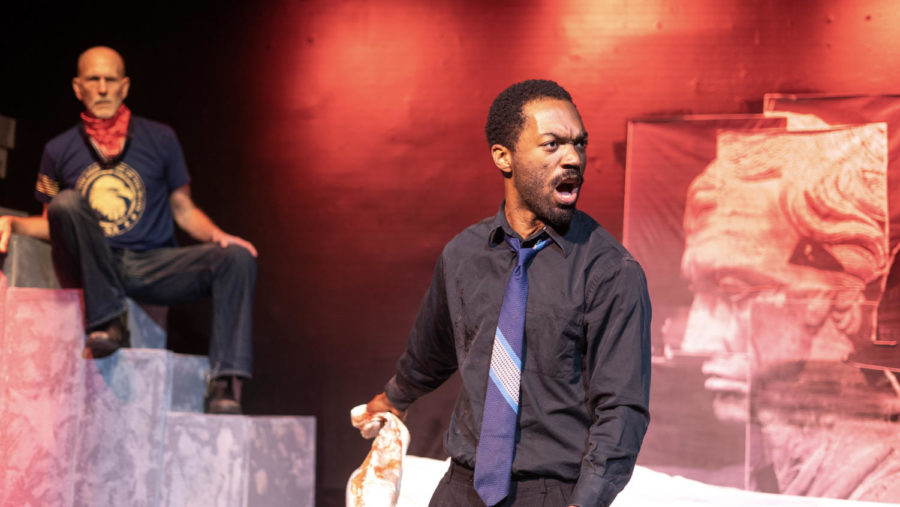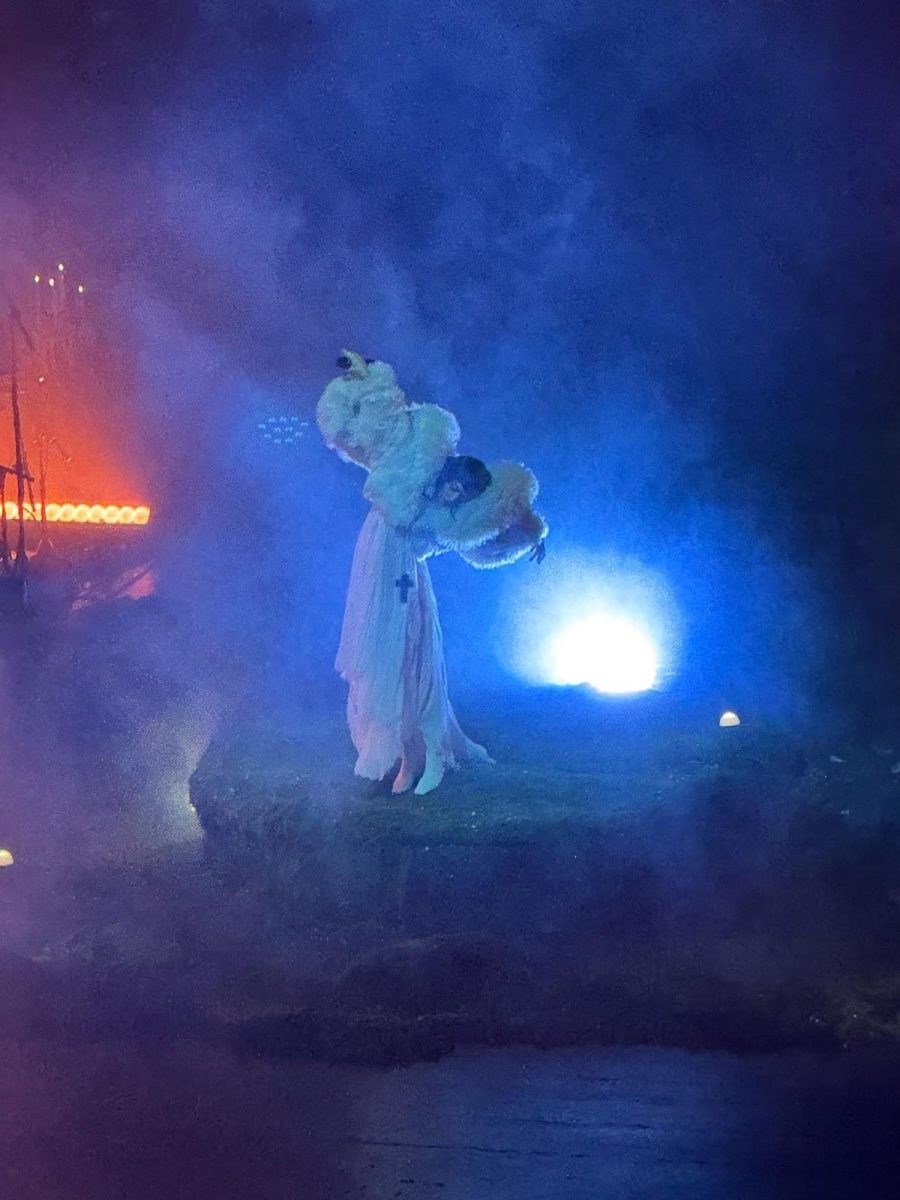“Brutus is an honorable man.”
Even if you’ve never seen Shakespeare’s Julius Caesar, you’re likely to have heard this quote from Caesar’s funeral in act 3, scene 2. Of course, the quote’s speaker, a simmering Mark Antony (played by a mostly skillful Mikha’el Amin in Invictus Theatre’s most recent production) is being sarcastic. He has no intention whatsoever of persuading his audience that Brutus is honorable. He’s condemning Brutus as a butcher, a murderer of Antony’s beloved sovereign Caesar. In other words, he’s describing Brutus as honorable according to one definition (having a good reputation) and dishonorable according to another (being a good person). The tension between those two definitions, and the question of which applies most aptly to the protagonist Brutus, is at the core of Julius Caesar—and, when it’s most effective, at the core of Invictus Theatre’s production. Unfortunately, the most powerful moments of this production come part and parcel with poorly fitting political metaphors and occasional weak acting.
Said weakness is rooted in a small, yet pernicious problem: A few of the actors tend to confuse shouting with impassioned acting. The play is staged in a very small room, which largely makes the experience more intimate and up-close. Sadly, it also leads to the roaring of Daniel Houle (who plays Cassius) and Chuck Munro (who plays Caesar) becoming absolutely deafening. I struggled not to cover my ears at points. Worse, much of the subtlety of Shakespeare’s dialogue is lost in indiscriminate noise.
Shouting aside, most of the acting comes across as genuinely strong. Charles Askenaizer plays Brutus and mostly plays him well—a good thing, since Brutus is the center of this play. Brutus comes across as slightly delicate, a scholar even, in military fatigues. His vanity is apparent from the outset, as is his naïveté and genuine conviction. Askenaizer shines in particular during his interactions with Cassius (whom Houle portrays with an intriguing mixture of brash aggression and sly shrewdness whenever he isn’t yelling). Their relationship evolves convincingly from pure trickery on Cassius’s part in the first scene into a friendship that’s equal parts authentic and touching by the end. That Askenaizer and Houle make this improbable journey not just believable but powerful is a remarkable accomplishment. It’s also a genuine pleasure to watch.
Amin as Mark Antony also deserves praise. His oration over Caesar’s body in the immediate aftermath of Caesar’s bloody death does the play justice. In Amin’s capable hands, all the artifice of Mark Antony’s oration only serves to better reveal his unending grief and fury. His king is dead, and he wants the world to burn.
I’ve emphasized thus far truth and earnestness. Julius Caesar is indeed a play about rhetoric and reputation, themes the directors highlight in the program. But far more than that, it’s a play about who people are deep down in their cores. It’s about that central question of who Brutus is, and in what way, if at all, he can be called an honorable man. The problem is, this rendition, despite posing that question, can’t seem to come to a consensus about Brutus. That’s in no small part a result of the fact that the directors chose to turn the play into a January 6 metaphor.
To clarify, I don’t have anything against January 6 metaphors in Shakespeare. A Richard III production I once saw used contemporary politics to great effect; however, in that case, the play fit the metaphor. Richard III is a villain—one with a sympathetic backstory, no doubt—but a conniving, calculating villain nonetheless. As an allegory for Trump, Richard III works. The problem with Invictus Theatre’s use of contemporary politics, aside from bludgeoning their message into viewers’ heads with all the subtlety of a cannonball (lines from Donald Trump’s January 6 speech are played over loudspeaker at the end of the production, with a spotlight shining on Brutus’s bloody corpse), is that it just doesn’t fit. Invictus Theatre associates rebellion against Caesar with the January 6 rioters (early criticizers of Caesar wear red baseball caps and Brutus’s army in the second half thrusts high a “Don’t Tread on Me” flag), but Brutus and his buddies are quite arguably the good guys in the play.
By over-and-over-again associating the January 6 rioters with Caesar’s assassins, Invictus Theatre muddles their own message. Are Cassius and company meant to be villains in their production, duping the over-earnest Brutus into treachery? The tent scene, along with Caesar’s egotistical lines, would suggest otherwise. Are they meant to be heroes? Clearly not, unless Invictus Theatre is significantly more right-wing than one would expect. Is Invictus Theatre trying to portray Brutus as a truly honorable man in the end? Trump’s words played over Brutus’s corpse would suggest otherwise. The likeliest interpretation I can come up with is the first—that Invictus’s Brutus is a cautionary tale, a poor fool duped by a mixture of vanity and good will into evil…but again, the intense complexity of Shakespeare’s text, which this production uses in its entirety, shoots that interpretation full of holes. The result is a rendition more confusing than powerful.
For a production faithful in text and emotionally potent, go see Invictus Theatre’s Julius Caesar. However, if you’re expecting coherent themes or perfection (or sympathize with January 6 rioters), I’d advise looking elsewhere.
Invictus Theatre’s production of “Julius Caesar” is playing at the Company’s Reginald Vaughn Theater through November 20th.








